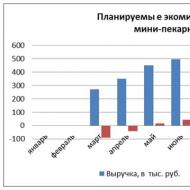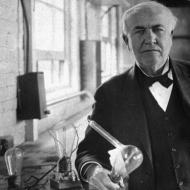
The Oracle of Omaha is the success story of billionaire Warren Buffett. How rich was Buffett at your age Warren Buffett's net worth
Greetings! Readers of my blog probably know who Warren Buffett is. The American investor and entrepreneur managed to become a dollar billionaire from scratch. In August 2017, Warren Buffett's fortune was estimated at $77.3 billion.
He has been called a “visionary,” the “Wizard of Omaha,” and the largest philanthropist in human history.
So, Warren Buffett: biography, achievements, interesting facts and quotes.
Warren Edward Buffett was born in the late summer of 1930 in the American city of Omaha (Nebraska). His father was politician and businessman Howard Buffett. By the way, the hero of my post is Jewish by nationality (on his mother’s side).
At the age of 6, little Warren earned his first money from resale. He bought a six-pack of Coca-Cola bottles for 25 cents and sold each one individually for 5 cents.
At age 11, Warren made his first stock trade at home. He and his sister bought three shares of Cities Service stock at $38.25 per share. Once the price rose to $40, the small trader sold the securities and recorded a net profit of $5. Just a few days later, Cities Service shares jumped to $202 per share. Warren Buffett made the first conclusions: an investor must be patient and not panic.
At the age of 13, the future “Wizard of Omaha” filed his first income tax return. In it, he deducted the cost of a wristwatch and a bicycle, since the costs of purchasing them were directly related to his work (Warren worked part-time as a newspaper delivery boy).
In his youth, Buffett saved up $1.5 thousand and bought a plot of land with this money. He leased the land to local producers.
In 1942, the investor's father, Howard Buffett, won election to the US Congress, and the family moved to Washington. In the USA, Warren enters Columbia University (New York). There he studies with the legendary Benjamin Graham (author of the best-selling book The Intelligent Investor). By the way, Buffett was the only student to whom the strict teacher gave the highest score.
The path to the first millions
Buffett's success story begins with the creation of his first investment partnership, Buffett Associates, in 1956. Over five years, shares in the partnership's portfolio grew by 251%. Buffett managed to turn $105 thousand of initial capital into $7 million! Over the same period, the Dow Jones Industrial Average rose only 74%. After another five years, the difference in growth was 1156% and 122%, respectively.

Warren's principle was to invest in shares of well-managed companies. He studied not only the accounting reports of enterprises (as Graham taught him), but also the biographies of top managers and the corporate structure of companies.
He was never interested in short-term speculation on news. Warren was invested in stocks for the long haul. Ideally - forever.
For the young investor, Buffett Associates became a launching pad for much larger projects. In 1959, the company was already valued at $102 million. And then, unexpectedly for everyone, Buffett makes a “knight’s move”: he dissolves the fund, sells all its assets and buys a tiny textile company on the verge of bankruptcy. Its name, Berkshire Hathaway, is now heard by private investors all over the world.
In 1959, BH shares were selling for $8 per share. But according to Buffett's calculations, the fair price for Berkshire Hathaway shares was $20. The owner directed all the company's income not to the development of textile production, but to the purchase of securities. At that time, the US insurance market was growing by leaps and bounds. Having assessed the prospects, Buffett buys five large insurance companies at once. And as always, it hits the mark. Since the Great Depression, insurance companies have become Americans' No. 1 investment.
Warren gradually transforms the former textile company into a giant investment holding. Berkshire Hathaway controls more than 40 companies in a variety of industries: finance, insurance, publishing, furniture production. By the age of forty, Buffett's fortune is already estimated at $28 billion.

The legendary investor continues to buy shares of “good” (in his opinion) companies. A “good” business for Buffett is an undervalued and successful business with strong operating and financial performance. In other words, Warren always relies on the results of fundamental rather than technical analysis.
Following this principle, Buffett acquired a large stake in Coca-Cola, Gillette and The Washington Post. During the time Warren owned them, the securities increased in price tenfold.
Unlike many billionaire investors, Buffett never bought stocks for speculation. He prefers to earn not so much, but consistently, from year to year.
In 2008, Warren Buffett was recognized as the richest person in the world by Forbes magazine.
About the rule “30% in stocks, 70% in bonds”
Often on the Internet I come across an alleged quote from Warren Buffett that he advises investing 70% of an investment portfolio in bonds, and 30% in stocks.

About the charity breakfast
Once a year, the legendary investor has breakfast with whoever wins the right at auction. In 2012, “breakfast with Warren Buffett” cost the lucky winner $3.5 million. The money is always donated to charity.
About charity
In June 2010, Warren Buffett transferred half of his fortune (about $37 billion) to five large charitable foundations. The act was recognized as the most generous act of charity in the history of mankind.
About Buffett's golden rules
In 1983, Warren Buffett formulated 13 principles of corporate governance. Among them there are some very unexpected ones. For example, “always have plenty of money in cash” or “don’t borrow.”

My personal favorite is this one: “Get healthy financial habits.” In my opinion, healthy habits in personal finance management are something that we are all sorely lacking.
For example, here is one of these habits from Warren Buffett: “You don’t need to save what’s left after going to the store. On the contrary, spend after you have saved something.” By the way, to form such a useful habit, it is enough to install an automatic “piggy bank” on your card.
About family
Warren Buffett has been married twice: to Susan Thompson (they remained married until her death in 2004, although the couple had been separated since 1977) and to Astrid Menks (they married in 2006, when Warren Buffett turned 76).
About cryptocurrencies
The “Oracle of Omaha” is skeptical about cryptocurrency. He says the trendy Bitcoin is a classic bubble because it is not a value-producing asset.
About Russia
In mid-2016, Warren Buffett said that our country has long become part of the Western world. And he is ready to invest in Russia as soon as the situation with economic sanctions resolves.

Buffett's short list of must-read books
It is said that when the legendary "Oracle of Omaha" began his career in investing, he read 600-1000 pages every day. Here are the books that, according to his advice, everyone should read:
- "The Intelligent Investor" Benjamin Graham.
Buffett believes that the book clearly and clearly describes how to make decisions and control emotions when building an investment portfolio. - "Common Stocks and Extraordinary Returns" by Philip Fisher.
The author explains why when choosing a company for investment, you need to evaluate not only financial statements, but also the quality of management. - "Essays on Investing, Corporate Finance, and Company Management" by Warren Buffett.
It was in this book that the world's best investor described his author's approach to investing. And it should be noted that he described it in very simple and figurative language. - "Investors vs. Speculators" John Bogle.
The main idea from the creator of the world's largest investment company: today, long-term investments are confidently replacing short-term speculation.

Warren Buffett's 10 Rules
- “Try to always reinvest your earnings.”
- “You don’t have to be a genius to invest well.”
- “It’s always an ideal time to own assets.”
- “I always knew that I would become rich. In my entire life I have never doubted this for a second.”
- "The stupidest reason to buy a stock is the fact that it's going up in price."
- “It’s better to buy an amazing company at a decent price than a decent company at an amazing price.”
- "Stay away from credit cards."
- “Ignore macroeconomics and politics when choosing assets.”
- “The price is what you pay. The cost is what you get.”
- “Only at low tide does it become clear who is swimming naked” (the quote refers to the “bubbles” that inflate in the economy in “well-fed” times and burst with a bang during a crisis).
Warren Buffett is a conservative, slightly old-fashioned and slightly tight-fisted billionaire. He is reluctant to invest in high technology, which he says he understands nothing about.
And if someone criticizes the billionaire for being too cautious, Buffett responds with the famous aphorism: “If you are so smart, then why am I so rich?”
A charity lunch with billionaire Warren Buffett was sold at an online auction for $2.6 million. The buyer was a fan of the entrepreneur who wished to remain anonymous. What is known is that he gets the right to meet the billionaire at the elite meat restaurant Smith and Wollensky in the center of New York in Manhattan.
Of course, auction participants shell out crazy amounts of money not for the sake of juicy steaks, but for the sake of the personality of Warren Buffett - the legendary 86-year-old American investor, owner of the Berkshire Hathaway holding, even during his lifetime. As of 2017, he ranks second in the Forbes global list of billionaires, with his fortune estimated at $76.9 billion.
Buffett previously said that lunch usually lasts about three hours, during which he is allowed to raise a variety of topics, with the exception of his own investment plans.
The right to lunch with the legendary investor has been sold annually since 2000. For the first time, the winner managed to have lunch with a financier for $25 thousand. During such auctions, the businessman managed to attract over $24 million. Today’s winner paid a substantial, but not a record amount. The most expensive lots were in 2012 and 2016 - about $3.5 million. And both then and now, these lucky ones chose to remain incognito, which is quite acceptable by the rules that Buffett himself established.
All proceeds from the event traditionally go to the Glide Foundation, which provides medical care and approximately a million free meals to those in need throughout the year. And in general, Buffett bequeathed most of his gigantic fortune to charitable needs, and he leads a very modest lifestyle for his status - he gave himself a salary of $100 thousand a year, eats in ordinary eateries, uses a used car and spent his entire life in his native Omaha .
The principles of its operation have long been described and at first glance seem very simple. In particular, he invests money only in those businesses that he understands and whose products he personally likes, and believes in his strategy, stubbornly following it and believing in its long-term performance, no matter how the current situation in the markets develops.
But the simplicity of Buffett's principles, as it turns out, does not allow a wide range of investors to repeat or even come close to his success. All this encourages people to shell out so much money to try to learn the secrets of the stock exchange guru in personal communication. For example, investor Guy Spear, who had lunch with Buffett in 2007, even wrote a book about how this conversation influenced his approach to investing.
In general, charity dinners are not new for America; many stars of show business, sports and politics do this. But the price of a meal with them is tens, at best hundreds of thousands of dollars. And only old Buffett is able to “raise” a couple of millions for a meal.
“For many years, Buffett worked for himself and his name, and now the name works for him,” notes Russian investor, managing partner of the financial group Fedor Spiridonov. “His name is a very expensive brand, for which people are willing to pay big money to be associated with it.”
Investment companies usually attract clients with one simple idea: invest in our fund, and we will provide you with higher returns than you could earn on your own. This can be done if you invest in assets whose value grows faster than the market, that is, faster or.
However, in reality, only a few manage to beat the market. At least, legendary billionaire Warren Buffett is firmly convinced of this. Thanks to thoughtful investments, he has long established himself among the ten richest people in the world with a fortune exceeding $70 billion. Many call him the best investor in history. Buffett's company, Berkshire Hathaway, has shown impressive results: its average return over the past 50 years is about 20% per annum. The billionaire has managed to outperform the market for decades, as the S&P 500 index over the same period showed an average return of just 9% per annum.
To whom did Buffett bequeath his billions?
Buffett is approaching 90 years old, so he made his will a long time ago. After his death, the main capital - Berkshire Hathaway shares - will be transferred to charitable foundations. He also made orders regarding the administration of his wife's trust. Buffett suggested that the trust manager should conduct business as follows: invest 10% of the money in short-term government bonds, and send 90% to a low-cost Vanguard index fund that follows the S&P 500 index. The financier explains the benefit of this approach in part by the fact that he will not have to spend money on highly paid managers .
Investment and hedge fund management services in the US are estimated at 1-1.5% per year. In Russia they charge 2-4% for management. This means that every year the investments of such funds must outperform the market by 1-4% percent, and in this case they will only equal it. Highly qualified managers can cope with this task for several years in a row; some are simply lucky, but most lose to the market.
Compared to regular investment funds, hedge funds charge even more commissions, making it even more difficult for them to provide an acceptable result for the investor.
Standard & Poor's (S&P) regularly publishes statistics that provide a clear picture of how well managers around the world are competing with the markets. And every year, stockholders see the markets win. About 84% of funds that invest clients in U.S. stocks underperformed the market over a five-year period, according to S&P data released in late 2015. Over 10 years, the result is almost the same - 83% of funds are worse than the market. In Europe, 70% of funds failed to outperform the market over any period.
These statistics confirm that it is usually better to invest in an index fund. Entrusting money to managers is a much less promising activity.
$1 million bet
Warren Buffett would argue with anyone that average investors are best off investing in index funds. He even made a $1 million bet on it.
In 2006, Buffett criticized hedge funds at a Berkshire Hathaway meeting, saying they were underperforming because of their high fees. The billionaire offered a bet to everyone that he could easily select an investment that would beat a basket of hedge funds. One well-known hedge fund manager, Ted Sides, agreed to take on the challenge. He said he would choose the optimal basket of hedge funds and beat any of Buffett's investments.
For the purity of the experiment, they decided to focus on a time period of 10 years. The experiment started on January 1, 2008, the result of the bet can be discussed after December 31, 2017. The financiers decided to donate the winnings to charity.
Buffett chose the low-cost Vanguard S&P 500 index fund. He bet on the assumption that the high fees charged by hedge funds would prevent them from outperforming the index fund for several years in a row.
The timing of the start of the dispute was not entirely successful by Buffett, to put it mildly. The terrible financial crisis hit in 2008, and Vanguard fell nearly 45% that year. Ted Sides had a little better luck, with a basket of hedge funds down 25%.
The team that selected hedge funds, led by Sides, was quite pleased: in one year they achieved an advantage of 20%. However, in subsequent years, Vanguard made up for lost time; by the end of 2015, it grew by 66% compared to 2008. The hedge fund basket is up just 22% over that period.
There are still a few weeks left before the dispute is summed up, but it is quite clear that Ted Sides will have to send money to charity. He appears to have changed his views on the stock market over the years. In a recent interview with a well-known American radio station, the financier said that you need to invest in indices, since you cannot constantly beat the market.
Other approaches are only relevant for those who clearly understand what they are doing. Index investing is pretty boring and not something you can show off at a party, but for most investors it is the best way to grow their capital.
Do you want to manage your money effectively? Do you want to make a fortune and live without financial worries?
No one else can give you better advice than Warren Buffett, whose net worth is over $72 billion, making him the third richest person in the world.
In addition, he often gives sound advice on how to achieve wealth that absolutely anyone can follow, regardless of whether they have experience investing or not.
Personal finance website GOBankingRates ranks the best advice Warren Buffett gave.
Here are six of Warren Buffett's best tips.
1. Never lose money
"Rule number 1: never lose money. Rule number 2: never forget rule number 1," said Buffett.Sure, this advice seems simple: no one thinks losing money is a good idea.
But if you look at this advice more broadly, it is very wise advice: avoid risks where possible. In particular, he notes, to be successful and happy, never risk what you need to get what you simply want, even if the odds are a thousand to one in your favor.
Following this rule, Buffett himself has repeatedly refrained from many risky investments over the years and missed out on opportunities that could have benefited him more, such as technology.
However, over time, by following this strategy of avoiding unnecessary risks, he was able to amass a huge fortune, and the strategy paid off in full.
2. Get high profits at low prices
“Price is what you pay, profit is what you get,” Buffett wrote in a letter to Berkshire Hathaway shareholders.You can lose money (and break rule number 1) if you pay a high price for something that gives you a low return.
This can happen if you go into debt, say taking out a credit card, as you will be forced to pay high interest in addition to the purchase price.
Or it happens when you buy something, no matter what - shares on the stock exchange or real estate - at a time when everyone is buying and prices on the market are inflated.
"Whether it's socks or stocks, I like to buy high-quality goods when the market is down," Buffett wrote. And this is a very reasonable approach.
3. Develop good financial habits
“More often than not, we behave in the ways we are accustomed to,” Buffett said during a speech to students, “and many people say that small habits are too invisible until they lead you to financial ruin.”We all have habits we like to break and habits we like to follow.
According to Buffett, the most important habit is saving money.
“The biggest mistake is not learning how to save money,” he said.
Consider setting up automatic bill payments or automatic transfers from your account to a savings or investment account to create a habit of saving money in the most painless and easy way.
4. Always have plenty of cash available
Buffett says Berkshire Hathaway always had at least $20 billion, but usually much more, in cash equivalents that could always be withdrawn if needed.Again, this is a risk-averse strategy, since this money could be invested in something. But according to Buffett himself, it was this strategy that kept his company out of trouble during the 2008 financial crisis, when many other companies were on the brink of collapse.
Of course, you don't have $20 billion to hide under your mattress. But you can set aside a portion of your money and keep it in cash or in savings accounts. This is especially important if you are an entrepreneur and do not have a regular income.
5. Invest in yourself
Buffett often talked about investing in yourself in every way, from taking care of your body and health to finding a job you enjoy and getting more education.“Anything you do to improve your abilities and make yourself more valuable will pay off in terms of increasing your purchasing power,” he said in an interview.
These investments will return tenfold, he notes, unlike other assets, your abilities and skills will not disappear from you.
This could mean continuing education courses, other types of training and education, starting your own business, or even some volunteer opportunities where you can learn new skills that you didn't have before.
Anything that makes you smarter makes you richer.
6. Set long-term goals
The mistake most people make is trying to take advantage of rising prices or quick gains in the short term, Buffett said.This way of thinking backfires on most people.
Instead, he advises investing in longer-term goals.
Instead of trying to make quick money, he advises, it's better to focus on growing your purchasing power over the course of your life.
This is a very reasonable approach.















